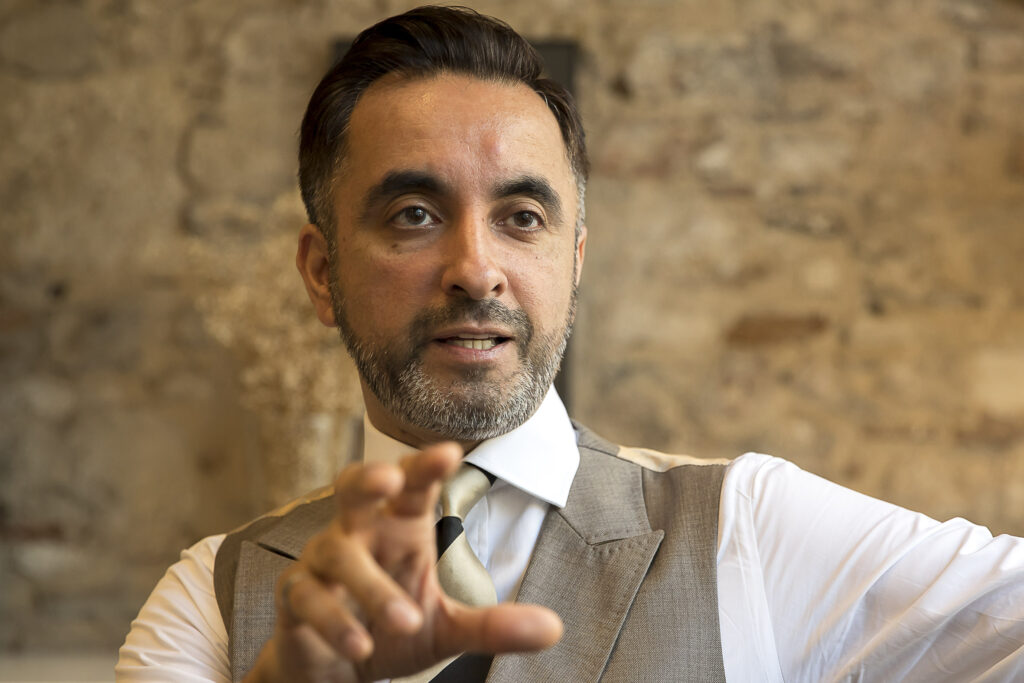13.01.2020 - 10:57
|
Actualització: 13.01.2020 - 11:57
Aamer Anwar speaks in a torrent of words, none of which are superfluous. For two years now he has been defending Clara Ponsatí —the Catalan minister who remains exiled in Scotland— from the attempts by Spain’s justice to secure her extradition. During this time he has witnessed with concern the evolution of the Catalan process amid Spain’s judicial, political and police repression. VilaWeb met Anwar one morning in Barcelona’s Gràcia neighbourhood during the week he spent in the city as our guest, ahead of an event for VilaWeb subscribers on Thursday. You can watch the video in Catalan and English here.
Anwar made the most of his trip to make political contacts, meet with officials and interview people who might be called to testify in Ponsatí’s extradition trial. Among the shortlisted names are former Spanish PM Mariano Rajoy and his successor, Pedro Sánchez. Not only does Anwar expect the European arrest warrant to be rejected on legal grounds, but he also wants to use the trial to expose this case of political persecution and criminalisation of a political movement internationally. He does not trust PM Pedro Sánchez one bit.
—Do you trust Pedro Sánchez to take steps in order to resolve the conflict?
—I no longer trust Pedro Sánchez to resolve the Catalan crisis. He has shown himself to be a weak politician, a weak leader and he has tried to use this crisis to assert his authority, to prove that he can be tougher than Rajoy. When Sánchez first came to office there was a glimmer of hope, the belief that he would opt for a political solution. But two years later we have political prisoners who have been sentenced to a hundred years in jail, we have exiles and humiliation. Sánchez’s own weakness is the base where he has left a void that has allowed the far right to grow. We have witnessed [far-right party] Vox being part of the prosecution in the trial against the Catalan leaders, pushing their own political agenda and shifting the Spanish parliament towards the far right and advocating a heavy-handed stance. Nearly every time that someone tries out a heavy-handed approach in Spain, they must be tougher on the Catalans. Every time they wish to prove their strong leadership, they must destroy Catalonia’s hope for independence.
—Could this weakness you have described be an opportunity for Catalonia’s independence movement?
—It might create opportunities in Catalonia. It means that the secessionist parties might refuse to cooperate, withdraw their support and refuse to discuss Sánchez’s demands. The Spanish PM’s position is so weak that you can’t help but wonder if he’ll manage to accomplish anything at all. What is the point of negotiating merely for the sake of it? For a long time Sánchez refused to engage in talks and in Catalonia you still have political prisoners, exiles and a president that they are trying to disqualify. Some time ago I said about Sánchez that this is no political negotiation: it is mobster politics. He claims to be the leader of a socialist government and I consider myself a socialist, but he does not represent me because of the way he has treated the people of Catalonia, their institutions and representatives. It is a disgrace, an abuse. And he still doing it because he is weak.
—Should ERC have refrained from helping Sánchez get re-elected?
—I don’t think PM Sánchez should have got their support. How can you negotiate with a government that disqualifies your president? In the past separatist representatives had already voted for Sánchez, but they achieved nothing. Besides, they should have allowed Junqueras to travel to Strasbourg to join Puigdemont and Comín [as MEPs].
—Sánchez could argue that it’s not up to him, that it is too late and that it’s for Spain’s Supreme Court to decide …
—He’ll always claim it’s too late. But the Supreme Court, the Spanish state and the government work as one. One hand won’t make a move without the assistance of the other. As prime minister, Sánchez could have said he believed that Junqueras ought to become a member of the European parliament. He could have come out and said he didn’t believe that a representative of the Catalan people should be disqualified for exercising his right to freedom of expression. He could have done that, it would have had symbolic value. But he wouldn’t even do that. Why couldn’t he make a statement like that at the very least?
—Is the path of talks with the PSOE that ERC has embarked upon not good? Shouldn’t they give it a try?
—Ultimately, people need to talk. On the one hand I agree that talks are necessary, otherwise there will never be an opportunity. The crux of the matter is that Catalonia is Spain’s last colony. Spain had an empire for six hundred years and when you’ve been a colonial power and had an empire, you behave like a slave driver. And when slaves keep going up to their masters and begging them to be freed (“Please, Master, remove these chains”), what do you expect the master will do? In the past masters would give their slaves better clothing, would feed them and present themselves as fair masters. And there lies the danger. Spain can use delay tactics and that’s the trap they’ve laid for you. And Catalonia has fallen into the trap of negotiating for the sake of it.
—How does that trap work?
—They have time and they can say they will negotiate for six months, one year, a year and a half… they can delay it, they have time. That suits Spain, but not Catalonia because it divides the independence movement. We have seen the two main parties quarrel. That’s what a colonial power will always be looking for: division. It is the rule of division. If the Catalan parties remained united, eventually Spain would have a problem. But so far they are split and everyone is looking to hold the power, to get a seat at the table. I have no interest in a seat at the negotiating table with Pedro Sánchez, if it will bring me nothing. You might get a nice cup of tea and a scone, but nothing will come out of it, there are no prerequisites … Well, actually the prerequisite is that Catalan independence will not be discussed. No discussion will be allowed on the matter. Therefore, how can you claim that this is a fair negotiation?
—You say the political parties should unite, but to do exactly what?
—Basically to have a single voice. Now they need to work for their national interest. Delay tactics weaken the independence movement and it’s been like that for five or ten years now. You have two options: either you walk in the footsteps of the past (which means seeing your presidents persecuted once again —ten of the last twelve— and keep moaning about Spain doing this and that, or you can set off in a new direction; in other words, you can learn from your mistakes. Spain always applies the same formula, repeating the same position. To begin with, they take your political leaders hostage, they are convicted or exiled; then they refuse to accept the judgement of Europe’s high court and finally they disqualify the president of Catalonia. It’s like being slapped in the face again and again. Oh, and after being slapped ten times you say: “let’s sit down, shake hands and have a cup of tea”. Would you do that with the playground bullies?
—What leverage does Catalonia have to do anything else other than that?
—The Catalan people. I think that when the Catalan people took to the streets in the aftermath of the verdict the politicians forgot that people have the power. It was the power of the people that made the independence referendum possible. The political parties have forgotten the power of the people. But they are not just lead soldiers that you can move up and down a board. Once you’ve asked them to come out to the streets, you’ve got to do something. It’s like fireworks: when you let them off, everyone watches the display in the sky; it’s beautiful, impressive. But they eventually come back down, and to do something with them you need to decide which direction to take. That means having a plan and explaining it to the people: this is our plan, one step at a time. I get the feeling everyone is wandering around blindfolded while saying “we want to talk, we want to negotiate, we want a phone call…” But nobody knows the course of action that is needed. And that is a weakness. What scares the Spanish state the most is the people, because they cannot jail millions of Catalans.
—They cannot throw millions of people in jail, but they have shown that they can lock up many social and political leaders. And that’s scary.
—The time for fear is over. It makes no sense to keep bringing up the history of repression, the history from three centuries ago, the repression that president Lluís Companys had to endure, the repression of the Franco regime and the exiles, of the sacrifices that were made, because what Catalonia is faced with now is less than what it faced in the past. So, if the political leaders are afraid, they should quit. They ought to know that they bear a great responsibility and I do not envy them at all for that: they are standing on the shoulders of giants, of history, of their forebearers, and their responsibility is to avoid making the same mistakes. We cannot allow this movement to keep celebrating its defeats. Instead, it should celebrate victories. Spain cannot send the police to beat up two million people who have taken to the streets. So it’s time the political leaders carried out the will of the people. How much more fear do you need? You have political prisoners, a disqualified president, exiles, the Spanish police sent to Catalonia to clamp down on you time and again. How much more fear do you need? Older people might justifiably be more afraid because they recall the Franco regime. Yet we saw them defending the polling stations [on October 1, 2017]. They didn’t care if they police were on their way. If they can do it, so can young people and the Catalan leaders.
—Were you disappointed by the politicians’ response to the verdict in the case of the Catalan leaders?
—I wouldn’t use the word “disappointed” because they are in a difficult position. But I get the feeling that there was no plan for when the verdict was announced. And when you encourage people to come out to the streets, you need to have a plan for them. I do not blame the protestors, I don’t blame them for any violence because it was the Spanish state and the Catalan police who were responsible for it. And the politicians who lost their nerve because they were not in control of the situation and wanted the people to go back home. One, two, three days of street protests … they saw it was getting out of hand, the violence, the young folk. Of course people were angry! In my view, if you are a political leader who wishes to encourage non-violent civil disobedience, you need to lead from the front. They mention Martin Luther King and Mahatma Gandhi, so what did they do? They would lead by example when they called on the people to take to the streets. Otherwise international media report it as riots. In short, there was no plan for when the verdict was announced, there were differences between JxCat and ERC and that was the problem.
—Do you think the Catalan government ought to release Junqueras so that he may travel to Strasbourg [as an elected MEP]?
—The Catalan government was in a tight spot when the prisoners were moved to the Lledoners facility [in Catalonia]. They became their new jailers. A while ago I travelled to Lledoners to visit the prisoners and told them that they had the keys to their own cells and they could unlock them. But, the thing is, the prisoners would have refused to come out. They want to continue the process. But presently we have a situation where Spain has shown that it is behaving in an unlawful manner, now that the Court of Justice of the EU has ruled that Junqueras is being held against the law. If you do not accept the legitimacy of the state, a fundamental question arises: will you accept the state’s legitimacy to rule over you? The Court of Justice of the EU has said it is unlawful to keep Junqueras in jail, so he should be released. And the Catalan government’s response should be: “We are freeing Mr Junqueras because his detention is unlawful and he must take his seat in the European parliament”. You let him out, he flies to Strasbourg and on January 13 he is in the European parliament. He has immunity because the Catalan people elected him. There is a bunch of hypocrites in Spain who claim that everyone must obey the law except them. They cannot override the European parliament and claim that Junqueras’ immunity must be suspended.
—Would the Catalan government have the legitimacy to do that?
—Yes. Catalonia is part of the EU and it is for Junqueras to decide if that’s what he wants to do.
—What are the consequences of the European Court’s ruling for Clara Ponsatí?
—Brexit will take place on January 31. That means Spain will be assigned additional seats in the European parliament and Clara Ponsatí will be receiving one. If she is an elected MEP, she will have the same immunity as Comín and Puigdemont. Then a legal debate will ensue as to whether Spain will withdraw the European arrest warrant against her or not. But at the very least she will be free to travel around Europe, even if her extradition process in Scotland is still unresolved. And she will take up her seat in the European parliament. That is the first consequence. Secondly, if Spain had any common sense —though I think they’ve lost it— they would drop the arrest warrant and accept what is effectively a humiliating defeat, a humiliation of the greatest sort for Spain in Europe’s courts of law and the European parliament. In Clara’s case, we intend to put up a fight in every instance against what Spain is doing. I think Spain will surrender because they realise there is no way forward for them.
—Should Spain decide not to drop the warrant, could the extradition process still move along, even if Ponsatí is an MEP?
—Yes, that’s a possibility. But it is unchartered ground. These questions have never been raised before. The European arrest warrant (EAW) is not intended for political exiles to be extradited back to their country and these issues had never come up until now. I believe that Clara will become an MEP and she will be given immunity throughout her extradition process. The question is whether the British authorities will then suspend her extradition. It is a possibility, indeed. But our situation is different from Belgium’s, where the legal system is different. The UK is not at the heart of Europe and we will be leaving the EU during this process. That is a complication: we are leaving Europe.
—Will the European arrest warrant system remain in place in the UK?
—The European extradition treaty is likely to stay because the UK’s judicial authorities believe it is a very powerful tool to extradite criminals. They want neither foreign criminals hiding in the UK, nor ours hiding in Europe. In the past they would hide on the Costa del Sol, which we used to call the Costa del Crime. Now the EAW system is supposed to be useful in the case of murderers, drug smuggling, child abuse, pedophiles and so on. But it’s being used against someone like Clara Ponsatí, an outstanding academic in the field of Economy and Finance. And what is her crime? She exercised the right to self-determination in a peaceful vote. To sum up, I think that the UK will keep the EAW post Brexit because neither the police nor the judges want to give it up. I think that if we defaulted to the extradition treaty that preceded the EAW, Clara’s extradition would be impossible.
—If Ponsatí becomes an MEP, could she return to Catalonia? Would you advise her not to?
—For now I’m looking forward to the day when she will take up her seat in the European chamber. She deserves it, she has fought with dignity and perseverance. It is one thing for her to be able to travel to Belgium, Strasbourg, to and from the European parliament. But travelling to Catalonia is a different kettle of fish. I would only see it possible for her to travel to Catalonia freely if Spain released Junqueras. If they recognise parliamentary immunity and European law, Junqueras must be freed. And, if that is so, then it also applies to Clara, Comín and Puigdemont. All of them should be able to travel to Barcelona freely, without being arrested. But the ball is on Spain’s court. Will they accept Europe’s legitimacy or that of a handful of members of the Electoral Board, who won’t allow them to be MEPs?
—A massive pro-independence rally is scheduled in Scotland this weekend. Do you believe Scotland will get a second referendum?
—Yes, absolutely. The question is when. I think Boris Johnson is on a collision course because the vast majority of Scottish seats were won by pro-independence candidates and Scotland’s government has a mandate for a referendum. The Green Party and SNP representatives hold the majority. But Johnson is an arrogant leader who is trying to score points in England; he has no interest in Scotland and says he won’t agree to a referendum. His problem won’t be now, when he must deliver Brexit, but next year. That’s when the real issues with the Tory policies on Brexit will begin to surface and we will have elections in Scotland. I think now we are beginning to see a split in the unionist camp. Scottish Labour have always been staunch unionists, but when their leadership says that they should break away from British Labour and support a referendum, we are beginning to see that the support base for independence is growing: besides the Greens and the SNP, we are beginning to get members of the Labour party.
—Will Johnson have no choice but to accept a second referendum?
—Yes.
—Do you expect Scotland’s second referendum to be staged unilaterally?
—Nicola Sturgeon and other leaders have repeatedly stated that they won’t declare independence unilaterally. Everyone brings up Catalonia’s situation, but I find that is unfair: in Catalonia they carried out the mandate of the people. The Scottish government is not considering this option, but Section 30 [whereby Westminster transfers temporary powers to Holyrood in order to call a referendum]. The Tories reply that this is done once in a lifetime. But if the conditions change, we must have another referendum. So if most Scottish people massively support a referendum in the 2021 elections —as I expect they will— how could [Johnson] possibly refuse? Those seats in parliament must be won, and not by 50 per cent plus one, but by 60 or 70 per cent. Then the conservatives won’t be able to prevent it.
—And would the referendum have a binary question, this time?
—This time I think there will be three choices: Yes, No and devolution max. That’s what they promised the last time. In 2014 we were told that if we voted No, we would stay in the EU and would have greater powers. What’s happened?
—Would the third option stand a chance to win?
—I don’t think so because Scotland has been humiliated and scorned, and people aren’t stupid.






